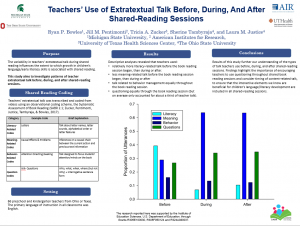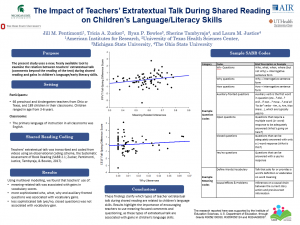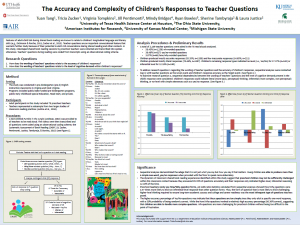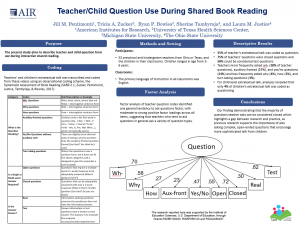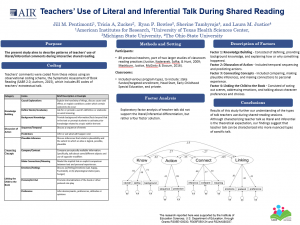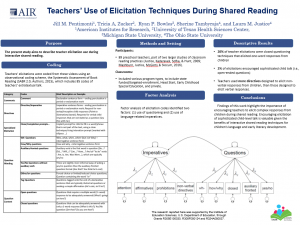Click the tabs below to read more about us and our research.
Dr. Jill M. Pentimonti is a principal researcher at the American Institutes for Research (AIR). She has expertise in language and literacy instruction, early childhood development, intervention research, and quantitative methods. Dr. Pentimonti also serves as the knowledge utilization service area lead for the National Center for Systemic Improvement (NCSI). Her work on NCSI includes professional development activities, trainings and development of resources to support state and local education agencies in selecting and using evidence-based practices. In addition, Dr. Pentimonti serves as the coordinator for knowledge development for the National Center on Intensive Intervention.
Dr. Tricia Zucker is an Associate Professor in the Children’s Learning Institute at the University of Texas Health Science Center at Houston. Dr. Zucker’s research interests include early identification and prevention of reading disabilities, evidence-based curriculum and instruction, effective use of technology for learning, family- and school-based interventions, and early childhood assessment. She is an expert in early literacy and language development, including development of inferential language skills. Her research focuses on children who are at-risk for learning disabilities.
Dr. Sherine Tambyraja is a Senior Research Specialist at the Crane Center for Early Childhood Research and Policy at The Ohio State University. She studies the speech, language and literacy acquisition in young children with communication disorders. Her recent work has also focused on parent-implemented approaches to boost children’s literacy skills, as well as ways to facilitate communication and collaboration between speech-language pathologists and parents of children with communication disorders.
Dr. Ryan P. Bowles studies early childhood language and literacy development at Michigan State University. He focuses on how assessments can be used most effectively to understand the skills kids need before they begin reading. Dr. Bowles is an expert in statistical analyses for assessments and development, including item response modeling, structural equation modeling, and longitudinal methods. Dr. Bowles is principal investigator on the NAP project, funded by the U.S. Department of Education Institute of Education Sciences (IES), which aims to develop a measure of narrative skills- a child’s ability to tell a coherent and interesting story- and is co-principal investigator on 8 other federally funded grants. Dr. Bowles teaches statistical methods classes for advanced graduate students in the social sciences, including Advanced Measurement.
Abstract: Participation in shared-reading experiences is associated with children’s language and literacy outcomes, yet few standardized assessments of shared-reading quality exist. The purpose of this study was to describe the psychometric characteristics of the Systematic Assessment of Book Reading (SABR), an observational tool designed to characterize the quality of classroom-based shared-reading sessions in early childhood settings. Participants included 105 preschool teachers. The quality of teachers’ videotaped, whole-class shared-reading sessions was examined using the SABR. Reliability levels for each of the SABRs five constructs were examined, as well as delayed alternate-form reliability and inter-rater reliability. The tools’ factor structure and construct validity were also assessed. Findings provide initial validation and preliminary evidence that the SABR is a reliable and valid tool. Potential uses for early childhood researchers, teachers, and allied professionals are described.
Citation: Pentimonti, J. M., Zucker, T. A., Justice, L. M., Petscher, Y., Piasta, S. B., & Kaderavek, J. N. (2012). A standardized tool for assessing the quality of classroom-based shared reading: Systematic Assessment of Book Reading (SABR). Early Childhood Research Quarterly, 27, 512-528.
Abstract: In this study, we examined the longitudinal relations between frequency and features of reading experiences within the preschool classroom to children’s language and literacy outcomes in kindergarten and 1st grade. Frequency refers to the number of shared reading sessions conducted each week as measured by teachers’ written reading logs recorded across the academic year. Features refers to teachers’ extratextual talk about literal, inferential, or print or phonological topics as assessed by analysis of 6 videotaped readings of narrative and informational texts collected across the preschool year. Participants were 28 preschool teachers and 178 children. The children were largely at risk and randomly selected from among those in each classroom to complete longitudinal assessments. In preschool, results showed that the frequency of classroom shared reading was positively and significantly related to children’s receptive vocabulary growth, as was the inclusion of extratextual conversations around the text; only extratextual conversations related to children’s preschool literacy growth. There was no evidence of differential influences of these experiences for children; that is, the relationship between frequency or features and children’s language and literacy development was not moderated by children’s initial skill level. Longitudinally, extratextual talk during preschool shared reading remained associated with children’s vocabulary skills through kindergarten, with trends toward significance extending to 1st grade literacy skills. The frequency of preschool shared reading was not a significant predictor of longitudinal outcomes.
Citation: Zucker, T. A., Cabell, S. Q., Justice, L. M., Pentimonti, J. M., & Kaderavek, J. N. (2012, October 15). The Role of Frequent, Interactive Prekindergarten Shared Reading in the Longitudinal Development of Language and Literacy Skills. Developmental Psychology. Advance online publication. doi: 10.1037/a0030347
Teachers’ Use of Extratextual Talk Before, During, and After Shared-Reading Sessions, presented at SSSR (July 2018)
The Impact of Teachers’ Extratextual Talk during Shared Reading on Children’s Language/Literacy Skills, presented at SSSR (July 2018)
The Accuracy and Complexity of Children’s Responses to Teacher Questions, presented at AERA (April 2018)
Teacher/Child Question Use during Shared Book Reading, presented at SREE (March 2018)
Teachers’ Use of Literal and Inferential Talk During Shared Reading, presented at SSSR (July 2017)
Teachers’ Use of Elicitation Techniques during Shared Reading, presented at SREE (March 2017)

